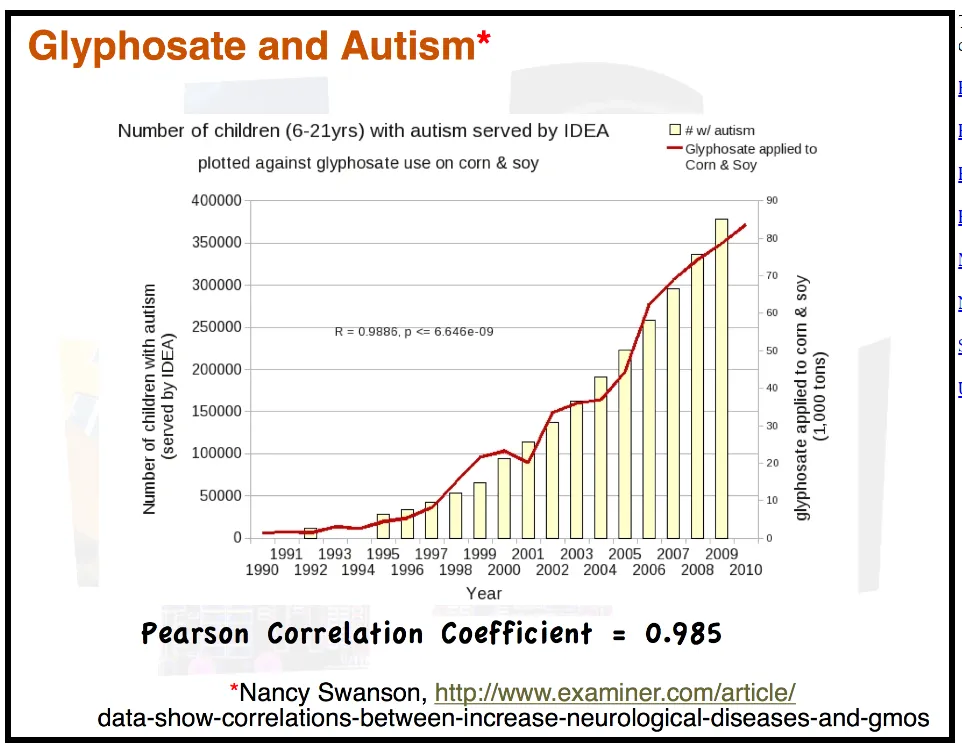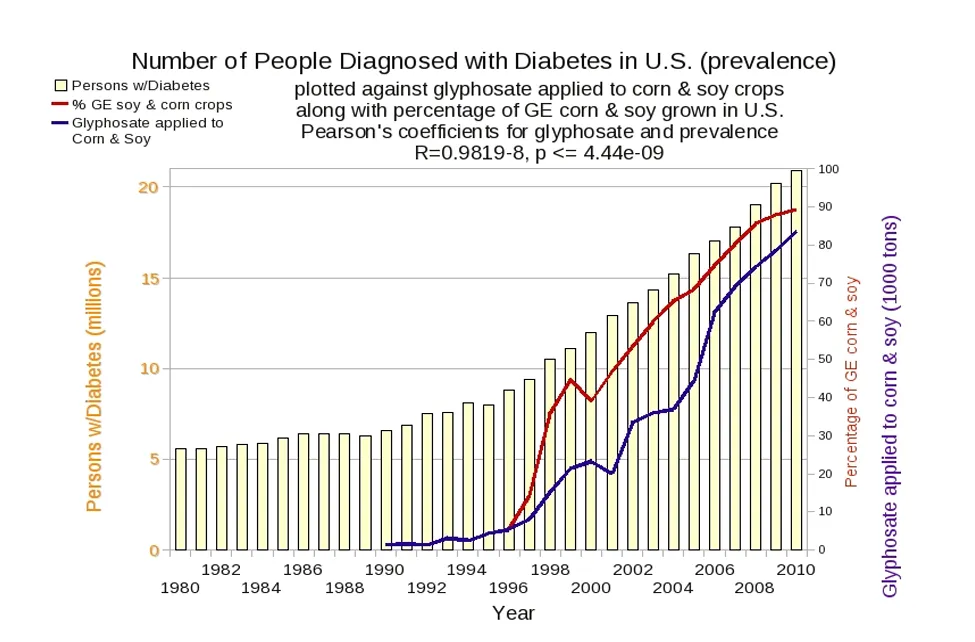The Link Between Diabetes and Other Increasingly Common Inattention-Related-Modern Diseases and the Key to Handling That Inattention
I was diagnosed with "inattentive" types ADHD and Type 1 Diabetes within a few years of each other. I chalk it up to being sensitive in a toxic cultural, emotional, and family system. I remember feeling distressed by the unhappiness everywhere, wondering what was wrong and how to help, but withdrawing into my animal friends and projects. My body may have tried to awaken me, but I was not paying attention, so I was primed for my pancreas to break when I experienced super intense stress in the summer of my 17th year at a summer camp for gifted kids. (That fall, as school started, I manifested all the symptoms of diabetes and was diagnosed.)
The Link Between ASD Spectrum and Diabetes AND Glyphosate
Evidence suggests that diabetes is related to ADHD on a spectrum because those diagnosed with both involve the exact dimensions of disruption caused by herbicides and poison in our environment. Autism is related to immune system dysfunction, including neuroinflammation, increased autoantibodies, or aberrations in immune cells, cytokines, and immunoglobulins.
According to a 2023 Healthline article, people with autism have a 57% higher risk of developing diabetes than people without autism. The risk is 64% higher for type 1 diabetes, and 146% higher for type 2 diabetes.
Zach Bush, MD is a triple board-certified physician specializing in Internal Medicine, Endocrinology and Metabolism, as well as in Hospice and Palliative care. The director of M Clinic in Virginia, Dr. Bush has published peer-reviewed articles and book chapters in the areas of infectious disease, endocrinology, and cancer. argues effectively and provides the science showing that the molecular cause is the same.
T1D occurs secondary to the destruction of insulin-producing beta cells (usually via autoimmune-mediated pathology) in utero, as does autism spectrum diseases. Glyphosate destroys that. And both are on the rise.
Those and related diseases' prevalence have risen in direct proportion because herbicides have been linked to a higher risk of developing diabetes. Certain herbicides also operate as environmental toxins. Glyphosate is a popular and extremely effective herbicide for weed control in grain crops that inhibits the shikimate pathway. It has been shown to influence endocrine function negatively. Few studies have demonstrated that glyphosate exposure results in hyperglycemic and insulin resistance, but the molecular mechanism underlying the diabetogenic potential of glyphosate on skeletal muscle and the endocrine system are related. Numerous chronic diseases, including cancer, diabetes, obesity, asthma, and infertility, are caused by glyphosate. Glyphosate is typically applied at a rate of 0.75 pounds of acid equivalent (a.e) per acre [8] and its half-life is predicted to be between 7 and 60 days. It is in most of our foods and groundwater - and diseases are rising in proportion.2
Diabetes and autism diseases have been increasing in diagnosis at the same rate both related to glyphosate use.
Glyphosate, Diabetes, and ASD Disease Incidence

Correlation does not necessarily imply cause and there may be other factors. Other known endocrine disruptors are: BPA (bisphenol-A) & phthalates (both in plastics), dioxins ( a by product of smelting, paper bleaching, manufacture of herbicides and pesticides), and atrazine polychlorinated biphenyls (PCBs -- used in electrical equipment, coatings, inks, adhesives, flame-retardants, and paints). However, the correlation is strong and uncanny, the occurrence of diabetes and autism almost unheard of before glyphosate and the other chemicals, and the common problems of inattention and diabetes too common.

See my other entry: How Mindfulness and Yoga Helps to Focus and Cultivate Attention
Citations
- L.G. Kahn, et al. 2023. “Glyphosate Potentiates Insulin Resistance in Skeletal Muscle through the Modulation of IRS-1/PI3K/Akt Mediated Mechanisms: An in Vivo and in Silico Analysis.” International Journal of Biological Macromolecules. Elsevier. May 18. https://www.sciencedirect.com/science/article/abs/pii/S0141813023018111#:~:text=Numerous%20chronic%20diseases%2C%20including%20cancer,between%207%20and%2060%20days.
- 2024. People. Accessed April 16. https://people.csail.mit.edu/seneff/glyphosate/glyphosate.html?fbclid=IwAR2xqednqr5X-XOcDR_doB2ySpZ42B7OOmDFyux_jA79ShqcyMErsg31LLU.
- “The Surprising Causes of Autism & Why It’s On The Rise | Dr. Suzanne Goh & Dr. Mark Hyman.” 2024. YouTube. YouTube. April 10. https://www.youtube.com/watch?v=PxaFOLQjLD0.
- Tromans S, Yao G, Alexander R, Mukaetova-Ladinska E, Kiani R, Al-Uzri M, Chester V, Carr R, Morgan Z, Vounzoulaki E, Brugha T. The Prevalence of Diabetes in Autistic Persons: A Systematic Review. Clin Pract Epidemiol Ment Health. 2020 Dec 31;16:212-225. doi 10.2174/1745017902016010212. PMID: 33719361; PMCID: PMC7931154.
- Sogard, A., & Mickleborough, T. (2022). The therapeutic potential of exercise and caffeine on attention-deficit/hyperactivity disorder in athletes. Frontiers In Neuroscience, 16. doi 10.3389/fnins.2022.978336
- “GMOs, Glyphosate & Gut Health.” 2018. YouTube. YouTube. March 12. https://www.youtube.com/watch?v=jWgnkgYtqnw.











